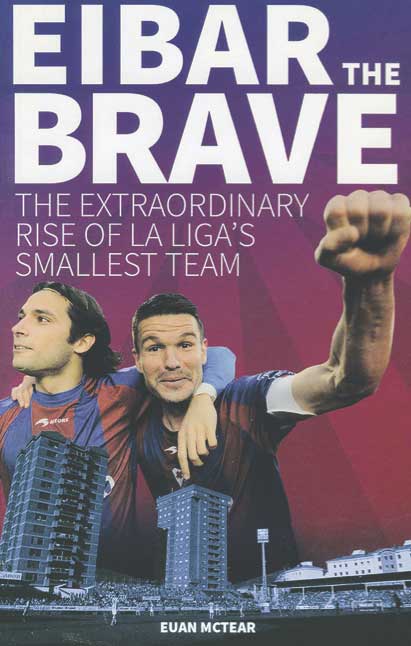 The extraordinary rise of La Liga’s smallest team
The extraordinary rise of La Liga’s smallest team
by Euan McTear
Pitch Publishing, £9.99
Reviewed by Phil Ball
From WSC 352 June 2016
The Eibar story is de facto a wonderful one, easy pickings for a half-decent author. Euan McTear, an ardent young blogger now resident in Belfast, had dabbled with journalism in Scotland and then spent time in Barcelona, using his residency there as the springboard for documenting Eibar’s maiden season in Spain’s top flight. McTear goes on to demonstrate with unbridled affection the vicissitudes of his adopted club’s foray into the limelight, and although the book was published with somewhat indecent haste (three months after the conclusion of the 2014-15 season), the rookie author comes over as genuine.
The decision to base the book on the 2014-15 season imposes obvious structural limitations and clearly restricts the longevity of its shelf-life. The other problem is that the (mainly) blow-by-blow account of Eibar’s 38 games inflicts the book with the chronicle-of-a-relegation foretold syndrome. Sometimes it’s engaging. At other times it feels like padding. The events surrounding Eibar’s first season are presumably well known to those who buy the book, and so what they require is some dramatic distraction in the meantime.
To be fair to McTear, he researches the club’s history impeccably, interviews a fairly wide range of people, intersperses the match reports with some mildly interesting forays into the history and characters of the club (the section on ex-coach Gaizka Garitano is particularly good) and manages to pull the reader into the story by dint of his unflappable enthusiasm.
Nevertheless, you emerge from the experience slightly fatigued. Reading the wholly unedited prose is like sharing a long half-pint with a tipsy enthusiast in a noisy Wetherspoon night, the narrator only half audible above the din as he attempts to describe to you, with ever-increasing hyperbole, the wonders of what he has witnessed. McTear’s reports suffer from a lack of restraint, but often from a lack of original expression that would have lent more colour and interest. His strategy of addressing the reader directly is particularly disconcerting. The otherwise well-observed section on the Guernica bombings is interrupted with an exhortation to witness the painting – “Google it and appreciate it!”
The Madrid-based journalist Sid Lowe is oddly ubiquitous, McTear calling on him like a wise genie whenever he cannot answer his own rhetorical questions. “I asked Sid Lowe if…” becomes the sub-leitmotif of the book, although it is never clear in what circumstances Lowe’s wisdom is solicited – over a relaxing café con leche or by the more prosaic medium of email. Indeed, a disappointing feature of the book as a whole is McTear’s failure to distinguish between the occasions on which he is actually live at an event, and those in which he is merely reporting second-hand.
It’s not a bad book, but it’s not a great one either. McTear, like his subject, cannot be faulted for effort, but there are only a certain number of times that a reader can be reminded that this is a “fairytale”, that David is slaying Goliath again, and that the entire Eibar squad earns less in a year than Ronaldo’s dog-walker. And at the end of the day, as McTear would say, Eibar are still up there. Anyone fancy writing the sequel?